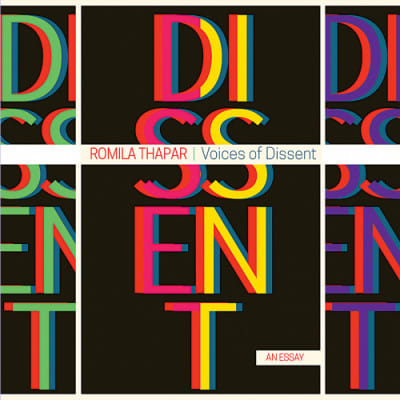Dissent through the Ages in the Indian Subcontinent

Eminent scholar and Emeritus Professor of History at Jawaharlal Nehru University, Romila Thapar, in her latest book, Voices of Dissent (Seagull Books, 2020), explores important perspectives on dissent located in the historical and contemporary context of the Indian subcontinent.
Dissent—and thereby the freedom to say what one wants to say—as a basic right has become uncommon with the rise of populist powers and the shrinking of civic spaces. Over this time, in the long and complicated history of the subcontinent, the forms of dissent have evolved accordingly. Professor Thapar's book traces "the larger historical context of the manifestations of dissent in various forms at distinctive times in the Indian past. The latter part of the essay is an attempt not only to relate the past to the present but also to suggest that some forms of dissent are continuities from the past." In the first few chapters, the book sketches out dissent as it has played out in the religious landscape through key periods in ancient and medieval India. In the next sections, Professor Thapar focuses on anti-colonial dissent, and finally into current day India, exploring the sort of criticism of the government that is now labelled "anti-national".
Thapar cites examples of dissent from pre-colonial times to contradict the rising theory that dissent is a borrowed Western concept. By documenting both violent and non-violent examples from the Maurya, Gupta, and Mughal periods, she confronts us with the idea that dissent is an inevitability. And there are always simple, inclusive ways to respond.
Our current systems, however, do not recognise all groups as equal. Those in authority demarcate boundaries between the 'self' and an 'other', and this breeds biases, it shapes how we personally and socially view these boundaries that are constructed more from fear, rather than knowledge, of the "other".
The book points out that history has always served the function of justifying the present. This is usually done by the people in power who push certain values and ideologies onto our pasts and place the past on a pedestal, all to make history fit their policies. Thapar draws on her own knowledge as a historian as well as well-accepted sociological theory to establish this position. She expertly locates her own biases and circumstances to give us a clear idea of her arguments. "To ignore the contribution of dissenting ideas to […] reformations […] is to ignore the impressive presence of dissent in assessing the cultivation of religion in India and in the underpinning of many social forms," she writes.
What makes this book of interest to us living in Bangladesh is the fact that it traces the history of dissent from before the subcontinent was divided. This history, therefore, is not just Indian; it is our shared history.
One should not expect to find an easy solution to issues of dissent as they are today in this book. Instead, books like Voices of Dissent serve the purpose of making systematic problems and challenges more visible. They seek to guide readers towards an understanding of where the roots of our present pains and injustices lie, so that we can go on to find sustainable and effective ways to respond.
Ishrat Jahan and Selima Sara Kabir are early stage researchers who write in their spare time.

 For all latest news, follow The Daily Star's Google News channel.
For all latest news, follow The Daily Star's Google News channel. 



Comments